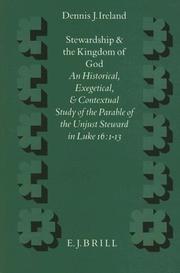| Listing 1 - 1 of 1 |
Sort by
|

ISBN: 9004096000 9004267042 9789004096004 9789004267046 Year: 1992 Volume: 70 Publisher: Leiden: Brill,
Abstract | Keywords | Export | Availability | Bookmark
 Loading...
Loading...Choose an application
- Reference Manager
- EndNote
- RefWorks (Direct export to RefWorks)
The parable of the unjust steward in Luke 16:1-13 is a unity which teaches faithful stewardship of material possession against an eschatological backdrop. This interpretation is confirmed by examination of the pericope itself and progressively wider levels of context within Luke's Gospel. Chapter one provides a history of recent interpretations of the parable (nineteenth and twentieth centuries) as background for the ensuing study. Detailed exegesis of Luke 16:1-13 itself is found in chapter two. The investigation is broadened in chapter three to include the immediate and broader literary contexts (Luke 15-16 and 9:51-19:44, respectively). Chapter four examines the theological context, in particular the themes of riches and poverty and the kingdom of God. Chapter five summarizes the major conclusions of the book. The book is a thorough summary of the literature on the parable, the central section, and the themes of riches and poverty and eschatology in the third Gospel.
Econome infidèle (Parabole) --- Onrechtvaardige rentmeester (Parabel) --- Unjust steward (Parable) --- Intendant malhonnête (Parabole) --- Bible. --- Criticism, interpretation, etc --- Critique, interprétation, etc --- 226.4 --- 225*33 --- #GROL:SEMI-225<08> Supp 70 --- Steward, Unjust (Parable) --- Evangelie volgens Lucas --- Parabels. Gelijkenissen --- Theses --- 225*33 Parabels. Gelijkenissen --- Intendant malhonnête (Parabole) --- Critique, interprétation, etc --- Criticism, interpretation, etc. --- Bible. N.T. Luke XVI, 1 13 --- Bible. N.T. Luke XVI, 1-13 - Criticism, interpretation, etc. --- Parable of the penitent steward
| Listing 1 - 1 of 1 |
Sort by
|

 Search
Search Feedback
Feedback About UniCat
About UniCat  Help
Help News
News